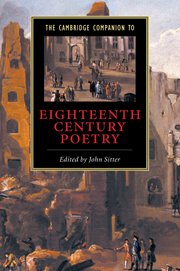Book contents
- Frontmatter
- 1 Introduction
- 2 Couplets and conversation
- 3 Political passions
- 4 Publishing and reading poetry
- 5 The city in eighteenth-century poetry
- 6 “Nature” poetry
- 7 Questions in poetics
- 8 Eighteenth-century women poets and readers
- 9 Creating a national poetry
- 10 The return to the ode
- 11 A poetry of absence
- 12 The poetry of sensibility
- 13 “Pre-Romanticism” and the ends of eighteenth-century poetry
- Index
10 - The return to the ode
Published online by Cambridge University Press: 28 May 2006
- Frontmatter
- 1 Introduction
- 2 Couplets and conversation
- 3 Political passions
- 4 Publishing and reading poetry
- 5 The city in eighteenth-century poetry
- 6 “Nature” poetry
- 7 Questions in poetics
- 8 Eighteenth-century women poets and readers
- 9 Creating a national poetry
- 10 The return to the ode
- 11 A poetry of absence
- 12 The poetry of sensibility
- 13 “Pre-Romanticism” and the ends of eighteenth-century poetry
- Index
Summary
But if I may be allowed to speak my mind modestly, and without injury to his [Cowley’s] sacred ashes, somewhat of the purity of English, somewhat of more equal thoughts, somewhat of sweetness in the numbers, in one word, somewhat of a finer turn and more lyrical verse, is yet wanting.
John Dryden, “Preface to Sylvæ”In December 1746, Joseph Warton published Odes on Various Subjects, and later in the same month his friend William Collins published Odes on Several Descriptive and Allegoric Subjects. Joseph Warton, in his “Advertisement” introducing his odes, urged readers to look upon these poems “as an attempt to bring back Poetry into its right channel.” These odes were examples of “invention” and “imagination”; and they were his effort to restore British poetry to its classical heritage. The “Advertisement” read as follows:
The Public has been so much accustom’d of late to didactic Poetry alone, and Essays on moral Subjects, that any work where the imagination is much indulged, will perhaps not be relished or regarded. The author therefore of these pieces is in some pain least certain austere critics should think them too fanciful and descriptive. But as he is convinced that the fashion of moralizing in verse has been carried too far, and as he looks upon Invention and Imagination to be the chief faculties of a Poet, so he will be happy if the following Odes may be look’d upon as an attempt to bring back Poetry into its right channel.
- Type
- Chapter
- Information
- The Cambridge Companion to Eighteenth-Century Poetry , pp. 203 - 224Publisher: Cambridge University PressPrint publication year: 2001
- 3
- Cited by

